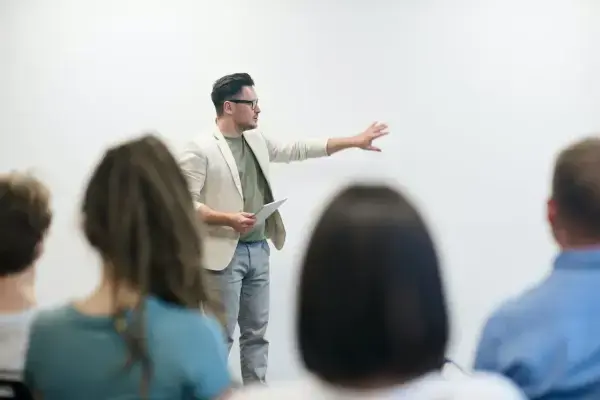
For Teachers & Professionals
Sex Education for individuals with Intellectual disabilities
Having good knowledge about sexuality and experiencing it in a positive and pleasurable way is a fundamental right. Individuals with intellectual disabilities are no different in this respect, and express the need and desire to form relationships, engage in sexual contact, and acquire sexual knowledge. Despite this, the situation is far from ideal. People with disabilities often experience problems related to the intimate and sexual area (such as difficulty in forming relationships) and show low levels of knowledge regarding sexuality-related topics such as masturbation, pregnancy, safe sex, reproduction, and same-sex relationships. Low levels of knowledge can impede, for example, the recognition of sexual abuse situations, safe sex practices, or the development of positive attitudes toward sexuality.
Intellectual disability alone does not explain the low levels of knowledge and skills. Many of the problems that directly influence the sexual health of individuals with intellectual disabilities are situated in their environment. One of these factors might be the absence or low frequency of sex education. There is a sort of bias or stereotype holding that people with disabilities must be “protected” and that they are vulnerable. Parents and teachers might think that teaching sex education can actually cause harm or lead to unwanted sexual behaviours. Sex education is done more in response to problems when they arise, rather than in a preventative way. People with intellectual disabilities often face barriers and lack access to sexual health education and acquire most of their knowledge through lived experience.
Effective sexual education should improve three areas: knowledge, attitudes and skills. All these areas can improve in people with intellectual disabilities following sexual education. It must be noted that there is still no gold standard in such a topic and sex education programs for individuals with intellectual disabilities often have an insufficient theory or evidence base and have not been properly evaluated. Knowing these limits, here are some useful ideas to start with.
1. Teaching knowledge and attitudes
Every child, no matter how significant their needs, requires and deserves access to developmentally appropriate and accurate sexual education. Sexual education encompasses more than sexual pleasure. It teaches body awareness, development, consent, choice, relationships, dignity, sexual health, and behaviour. The modules of sexual education should include: the tendency toward the opposite sex and boundaries. For example, teaching that it is not appropriate to touch other people without consent and they shouldn’t let strangers touch them. Concepts like privacy may be quite abstract. Start with concrete examples and a simple discriminator. For example, “You wear pants and shirts to cover your private parts. Those are parts that only you can touch”, physical changes during adolescence (explaining what is happening or will happen to their bodies), personal hygiene (and why it is important), topics about friendships and relationships, sexual identity discussions. It is important to remember that the teaching must be interactive and not just passing information. One example of an exercise in order to reflect on the differences between a friendship and a relationship is showing pictures of people having different kinds of interaction and discussing the pictures together. People with disability also desire attention to relationships as a central topic and as an approach to sexual health education, yet learned mostly about safety, consent, and biology. Although these are vitally important topics, education should put more focus on the positive elements of sexuality, such as communication, intimacy, and pleasure.
2. Teaching skills
For improving the skills of individuals with intellectual disabilities methods such as modelling, role-play, rehearsal, and practice skills can be quite useful. Modelling and rehearsing both in role-play and in real life are the most important part of every skill acquisition. Role-play, rehearsal, and practice skills are in fact a small part of a method called guided practice. Guided practices are defined as prompting individuals to rehearse and repeat the behaviour various times, discuss the experience, and provide feedback. Reinforcement and corrective feedback seem to have been commonly used methods.
It is a priority for those who want to undertake sex education with children with intellectual disabilities to have clear in mind what are the aims of the program and create a more specific subdivision of the topics and exercises. In order to do that, it is advisable to acquire more knowledge in this specific field through courses and book readings. People with ID need to be represented, have greater access to accessible sexual health information, and be able to attend sexual education programs that are designed also for them (for example an educator should be knowledgeable if children can read text or not and how to overcome this barrier) and be involved on a teaching level for professionals and individuals during sexual health education sessions.
REFERENCES
Hole, R., Schnellert, L., & Cantle, G. (2022). Sex: What is the big deal? Exploring individuals’ with intellectual disabilities experiences with sex education. Qualitative health research, 32(3), 453-464.
Schaafsma, D., Kok, G., Stoffelen, J. M., & Curfs, L. M. (2015). Identifying effective methods for teaching sex education to individuals with intellectual disabilities: A systematic review. Journal of sex research, 52(4), 412-432.
Share the knowledge!
More For Teachers & Professionals Q&A

The Characteristics of Sex Education Teachers

PEARLS model to talk about Sexuality

Pregnancy and Sexuality

LGBTQIA+ Community and Health Care Services

Female cancer and Sexuality – Part 2: Intervention regarding female sexual health

Plastic Surgery and Discussion on Sexuality
This is a website that WE are building together. If you have a question there is no answer to on this site, send it here!
